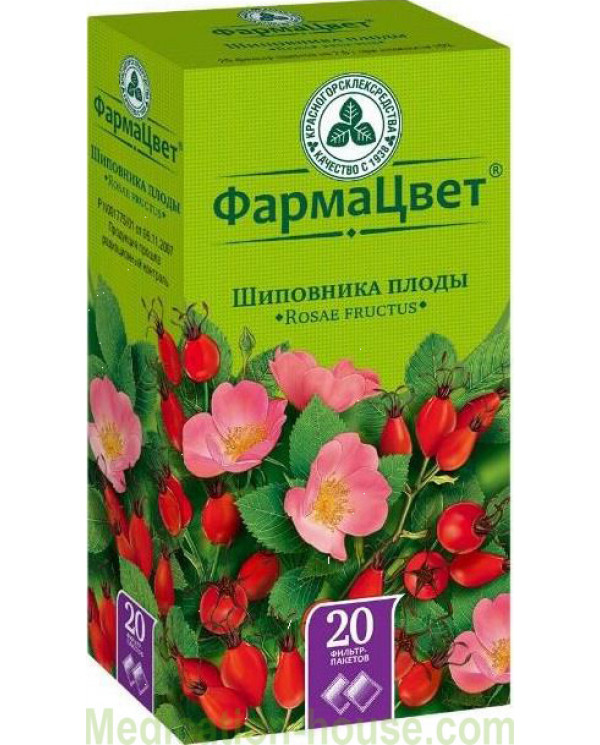Rosehips fruits user manual
Reed more and buy Rosehips fruits here
Indications for use
Hypovitaminosis C and P (treatment and prevention); asthenia, immunodeficiency states. Rosehips of low vitamin varieties - only as a choleretic drug in the complex treatment of non-calculous cholecystitis, chronic hepatitis and hepatocholecystitis.
Pharmacodynamics
Useful properties of rose hips: vitamin, tonic, antimicrobial, choleretic, anti-inflammatory, anti-atherosclerotic. Rosehips are a multivitamin with a predominance of vitamin C - ascorbic acid., As well as vitamin P (rutin), groups B, K, carotene, vitamin E. In addition, the fruits contain flavonol glycosides campferol and quercetin, sugar up to 18%, tannins - up to 4.5%, pectins-3.7%, organic acids: citric - up to 2%, malic - up to 1.8%, etc .; lycopene, rubixanthin, essential oil, a significant amount of potassium salts, iron, manganese, phosphorus, calcium, magnesium. Rose hips have phytoncidal and powerful bactericidal properties.
Rose hips, in addition to multivitamin properties, have choleretic, anti-inflammatory, regulating the activity of the gastrointestinal tract, as well as diuretic properties that are not accompanied by irritation of the kidney tissue.
Vitamin C - ascorbic acid - is involved in many redox processes in the body. Rosehip weakens the development of atherosclerosis. Vitamin P helps to reduce the fragility of capillaries, improves the body's use of ascorbic acid. Vitamin A - carotene - affects the increase in overall body resistance. Vitamins B1, B2 affect the blood-forming organs, improve vision. Vitamin K contributes to normal blood coagulation.
Contraindications
A large amount of ascorbic acid in decoction, infusion or tea from rose hips can destroy tooth enamel. After taking the rose hip, rinse your mouth with clean water. To reduce the destructive effect of acids on tooth enamel, you can drink rosehip infusion through a straw.
For the same reason (high content of ascorbic acid), rosehip preparations are contraindicated in gastritis, peptic ulcer of the duodenum or stomach with high acidity.
Heart failure of the third degree, endocarditis and thrombophlebitis are contraindications for taking preparations from rose hips due to the high content of vitamin K in them, which increases blood clotting and, therefore, increases the risk of thrombosis in these diseases.
You should know the measure in the treatment of wild rose. Long-term use of infusion, broth or syrup of dogrose, useful for hepatitis, cholecystitis, can have the opposite effect on the liver - cause stagnation of bile and worsening of the condition. Therefore, the treatment of hepatitis with wild rose must be alternated with other herbs - saber-toothed, goldenrox, elecampane, immortelle sand.
Hypotonic patients should remember that the infusion and decoction of rose hips lowers pressure and, if necessary, compensate for this effect.
Side effects
Allergic reactions.
Interactions with other drugs
Due to the presence of ascorbic acid in the preparation, it is possible: increased absorption of drugs of the penicillin, tetracycline and iron groups; a decrease in the clinical effect of heparin and indirect anticoagulants; increased risk of crystalluria during treatment with salicylates and sulfonamides; slowing the excretion of acids by the kidneys, including acetylsalicylic acid; increased excretion of drugs having an alkaline reaction, including alkaloids; a decrease in the concentration of oral contraceptives in the blood.
How to take, course of administration and dosage
2 filter bags (4 g) are placed in glass or enameled dishes, 200 ml (1 cup) of boiling water are poured, covered and insisted for 15 minutes, periodically pressing the bags with a spoon, then squeezing them. The volume of the resulting infusion is adjusted with boiled water to 200 ml.
Take orally in a warm form after eating: adults and children over 12 years old - 1/2 cup 2 times a day, children from 6 to 12 years old - 1/4 cup 2 times a day; from 3 to 5 years - 2 tablespoons 2 times a day; from 1 year to 2 years - 1 tablespoon 2 times a day; children from 6 months to 1 year - 1-2 teaspoons per day.
Shake the infusion before use.
Terms of sell
You can buy Rosehips fruits without a prescription.

